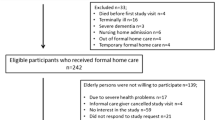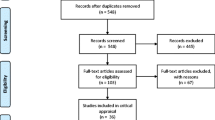Abstract
The World Health Organization (WHO) reports that over 20% of adults aged 60 and over suffer from a mental or neurological disorder and 6.6% of all disability (disability adjusted life years-DALYs) among people over 60 years is attributed to mental and neurological disorders. Oral healthcare professionals will be called to care for older adults with dementia, delirium, and depression in outpatient and inpatient settings. Poor oral health can be devastating for the older adult, compound psychosocial problems, frustrate caregivers and healthcare staff, and disrupt family dynamics. The contributing factors to poor oral health such as rapid dental decay, acute and chronic periodontal infections, compromised systemic health, xerostomia, and reduced fine motor function, in the context of declining cognition and motivation, may lead to an increase in both morbidity and mortality and negatively impact quality of life. In this chapter, we present a brief overview of cognitive and mood disorders in older adults including dementia, depression, and delirium; explore the relationship of oral health and these conditions; and offer advice on clinical interventions. We also discuss the epidemiology of these conditions among older adults with special reference to oral healthcare settings. We discuss how the assessment and management of oral conditions may be adapted to patients with cognitive and mood disorders and give oral health clinicians practical advice on how they should screen for and manage these disorders in their dental practice. Finally, we formulate an agenda for future research to obtain a better understanding of how dementia, delirium, and depression impact oral health and the interventions that may be needed to address these conditions in the older population.
Access this chapter
Tax calculation will be finalised at checkout
Purchases are for personal use only
Similar content being viewed by others
References
Organization, W.H. Mental Health of older adults 2017 [cited 2020]; Available from: https://www.who.int/news-room/fact-sheets/detail/mental-health-of-older-adults. Accessed 30 Nov 2020.
Brennan LJ, Strauss J. Cognitive impairment in older adults and oral health considerations: treatment and management. Dent Clin N Am. 2014;58(4):815–28.
Knopman DS, et al. Practice parameter: diagnosis of dementia (an evidence-based review). Report of the quality standards Subcommittee of the American Academy of Neurology. Neurology. 2001;56(9):1143–53.
Dubois B, et al. Preclinical Alzheimer's disease: definition, natural history, and diagnostic criteria. Alzheimers Dement. 2016;12(3):292–323.
Manly JJ, et al. Frequency and course of mild cognitive impairment in a multiethnic community. Ann Neurol. 2008;63(4):494–506.
Tanner P. Dementia: prevalence, risk factors and management strategies. Nova Science Publishers, Inc; 2014.
Petersen RC, et al. Practice parameter: early detection of dementia: mild cognitive impairment (an evidence-based review). Report of the quality standards Subcommittee of the American Academy of Neurology. Neurology. 2001;56(9):1133–42.
Caselli RJ. Current issues in the diagnosis and management of dementia. Semin Neurol. 2003;23(3):231–40.
Knopman DS, Boeve BF, Petersen RC. Essentials of the proper diagnoses of mild cognitive impairment, dementia, and major subtypes of dementia. Mayo Clin Proc. 2003;78(10):1290–308.
Small SA, et al. Selective decline in memory function among healthy elderly. Neurology. 1999;52(7):1392–6.
Reisberg B, et al. Memantine in moderate-to-severe Alzheimer's disease. N Engl J Med. 2003;348(14):1333–41.
Qaseem A, et al. Current pharmacologic treatment of dementia: a clinical practice guideline from the American College of Physicians and the American Academy of Family Physicians. Ann Intern Med. 2008;148(5):370–8.
Inouye SK, Westendorp RG, Saczynski JS. Delirium in elderly people. Lancet. 2014;383(9920):911–22.
Han JH, et al. Delirium in the emergency department: an independent predictor of death within 6 months. Ann Emerg Med. 2010;56(3):244–252.e1.
Marcantonio ER, et al. Outcomes of older people admitted to postacute facilities with delirium. J Am Geriatr Soc. 2005;53(6):963–9.
Fong TG, et al. Delirium accelerates cognitive decline in Alzheimer disease. Neurology. 2009;72(18):1570–5.
Fong TG, et al. Adverse outcomes after hospitalization and delirium in persons with Alzheimer disease. Ann Intern Med. 2012;156(12):848–56. w296
Gross AL, et al. Delirium and long-term cognitive trajectory among persons with dementia. Arch Intern Med. 2012;172(17):1324–31.
United States Department of Health and Human Services Agency for Health Care Policy and Research. Recognition and initial assessment of Alzheimer’s disease and related dementias. In: Clinical practice guidelines, number 19; 1996.
Oh ES, et al. Delirium in older persons: advances in diagnosis and treatment. JAMA. 2017;318(12):1161–74.
Kessler RC, et al. Development of lifetime comorbidity in the World Health Organization world mental health surveys. Arch Gen Psychiatry. 2011;68(1):90–100.
Spitzer RL, Kroenke K, Williams JB. Validation and utility of a self-report version of PRIME-MD: the PHQ primary care study. Primary care evaluation of mental disorders. Patient health questionnaire. JAMA. 1999;282(18):1737–44.
Ansseau M, et al. High prevalence of mental disorders in primary care. J Affect Disord. 2004;78(1):49–55.
Linzer M, et al. Gender, quality of life, and mental disorders in primary care: results from the PRIME-MD 1000 study. Am J Med. 1996;101(5):526–33.
Roca M, et al. Prevalence and comorbidity of common mental disorders in primary care. J Affect Disord. 2009;119(1–3):52–8.
Luppa M, et al. Age- and gender-specific prevalence of depression in latest-life--systematic review and meta-analysis. J Affect Disord. 2012;136(3):212–21.
Saveanu RV, Nemeroff CB. Etiology of depression: genetic and environmental factors. Psychiatr Clin North Am. 2012;35(1):51–71.
Alexopoulos GS. Depression in the elderly. Lancet. 2005;365(9475):1961–70.
Lockwood KA, Alexopoulos GS, van Gorp WG. Executive dysfunction in geriatric depression. Am J Psychiatry. 2002;159(7):1119–26.
Elderkin-Thompson V, et al. Neuropsychological deficits among patients with late-onset minor and major depression. Arch Clin Neuropsychol. 2003;18(5):529–49.
Butters MA, et al. Changes in cognitive functioning following treatment of late-life depression. Am J Psychiatry. 2000;157(12):1949–54.
Murphy CF, Alexopoulos GS. Longitudinal association of initiation/perseveration and severity of geriatric depression. Am J Geriatr Psychiatry. 2004;12(1):50–6.
Nebes RD, et al. Persistence of cognitive impairment in geriatric patients following antidepressant treatment: a randomized, double-blind clinical trial with nortriptyline and paroxetine. J Psychiatr Res. 2003;37(2):99–108.
Mitchell AJ, Vaze A, Rao S. Clinical diagnosis of depression in primary care: a meta-analysis. Lancet. 2009;374(9690):609–19.
Sparks Stein P, et al. Serum antibodies to periodontal pathogens are a risk factor for Alzheimer's disease. Alzheimers Dement. 2012;8(3):196–203.
Venete A, et al. Relationship between the psychosocial impact of dental aesthetics and perfectionism and self-esteem. J Clin Exp Dent. 2017;9(12):e1453–8.
Delwel S, et al. Oral hygiene and oral health in older people with dementia: a comprehensive review with focus on oral soft tissues. Clin Oral Investig. 2018;22(1):93–108.
Lauritano D, et al. Oral health status and need for oral care in an aging population: a systematic review. Int J Environ Res Public Health. 2019;16(22):4558.
Wu B, et al. Association between oral health and cognitive status: a systematic review. J Am Geriatr Soc. 2016;64(4):739–51.
Foley NC, et al. A systematic review examining the oral health status of persons with dementia. JDR Clin Trans Res. 2017;2(4):330–42.
Acharya A, et al. Dental conditions associated with preventable hospital admissions in Australia: a systematic literature review. BMC Health Serv Res. 2018;18(1):921.
Klotz AL, et al. Is compromised oral health associated with a greater risk of mortality among nursing home residents? A controlled clinical study. Aging Clin Exp Res. 2018;30(6):581–8.
Stepović M, et al. Barriers affecting the oral health of people diagnosed with depression: a systematic review. Zdr Varst. 2020;59(4):273–80.
Matevosyan NR. Oral health of adults with serious mental illnesses: a review. Community Ment Health J. 2010;46(6):553–62.
Kisely S, et al. The oral health of people with anxiety and depressive disorders - a systematic review and meta-analysis. J Affect Disord. 2016;200:119–32.
Kisely S, et al. A systematic review and meta-analysis of the association between poor oral health and severe mental illness. Psychosom Med. 2015;77(1):83–92.
Cademartori MG, et al. Is depression associated with oral health outcomes in adults and elders? A systematic review and meta-analysis. Clin Oral Investig. 2018;22(8):2685–702.
Pearson A, Chalmers J. Oral hygiene care for adults with dementia in residential aged care facilities. JBI Libr Syst Rev. 2004;2(3):1–89.
Manchery N, et al. Are oral health education for carers effective in the oral hygiene management of elderly with dementia? A systematic review. Dent Res J (Isfahan). 2020;17(1):1–9.
Chalmers JM, Pearson A. A systematic review of oral health assessment by nurses and carers for residents with dementia in residential care facilities. Spec Care Dentist. 2005;25(5):227–33.
Cerajewska TL, West NX. Dementia friendly dentistry for the periodontal patient. Part 1: recognising and assessing patients with dementia. Br Dent J. 2019;227(7):563–9.
Rozas NS, Sadowsky JM, Jeter CB. Strategies to improve dental health in elderly patients with cognitive impairment: a systematic review. J Am Dent Assoc. 2017;148(4):236–245.e3.
Jablonski RA, et al. Randomised clinical trial: efficacy of strategies to provide oral hygiene activities to nursing home residents with dementia who resist mouth care. Gerodontology. 2018;35(4):365–75.
Mun SJ, et al. Reduction in dental plaque in patients with mental disorders through the dental hygiene care programme. Int J Dent Hyg. 2014;12(2):133–40.
Friedlander AH, et al. Dental management of the geriatric patient with major depression. Spec Care Dentist. 1993;13(6):249–53.
Alabdullah J, Almuntashiri A. Strategies for safe and effective treatment of patients with Alzheimer disease. Dimen Dental Hygiene. 2020;18(7):32–5.
Brown J, et al. Self administered cognitive screening test (TYM) for detection of Alzheimer's disease: cross sectional study. BMJ. 2009;338:b2030.
Bruce ML, et al. Reducing suicidal ideation and depressive symptoms in depressed older primary care patients: a randomized controlled trial. JAMA. 2004;291(9):1081–91.
Marcantonio ER, et al. 3D-CAM: derivation and validation of a 3-minute diagnostic interview for CAM-defined delirium: a cross-sectional diagnostic test study. Ann Intern Med. 2014;161(8):554–61.
Author information
Authors and Affiliations
Corresponding author
Editor information
Editors and Affiliations
Rights and permissions
Copyright information
© 2022 The Author(s), under exclusive license to Springer Nature Switzerland AG
About this chapter
Cite this chapter
Resendes, N., Hammel, I., Hogue, CM. (2022). The 3 Ds: Dementia, Delirium and Depression in Oral Health. In: Hogue, CM., Ruiz, J.G. (eds) Oral Health and Aging. Springer, Cham. https://doi.org/10.1007/978-3-030-85993-0_9
Download citation
DOI: https://doi.org/10.1007/978-3-030-85993-0_9
Published:
Publisher Name: Springer, Cham
Print ISBN: 978-3-030-85992-3
Online ISBN: 978-3-030-85993-0
eBook Packages: MedicineMedicine (R0)




